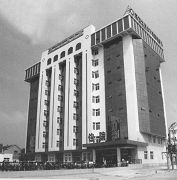(Clearwisdom.net) Laixi No. 2 People's Hospital of Shandong Province actively persecutes Falun Dafa practitioners and brutally force-feeds practitioners who are hunger striking to protest the persecution. The hospital and the Laixi police have cooperated with each other to do this over and over again. They took four practitioners to a mental hospital for further persecution and injected them with drugs that damage the central nervous system.
Please find below information we have gathered to provide evidence of the persecution.
Laixi No. 2 People's Hospital is located at No. 8 West Weihai Road, Laixi City, Shandong Province. It is a centralized hospital, with the compound and buildings covering 13,000 square meters. The buildings sit on 22,500 square meters.
In the 1980s and early 1990s, Laixi No. 2 People's Hospital was the Laixi Mental Hospital, and it was a small, little-known hospital. After it became profitable, it was converted to a centralized hospital. But it could never compare to the Laixi City County Level People's Hospital, which used to be a county hospital and which now employs many people, although there are not many patients.
Since the CCP began to persecute Falun Gong on July 20, 1999, Laixi No. 2 People's Hospital has adhered diligently to the CCP's orders in its persecution of Falun Dafa and Falun Dafa practitioners. Local practitioners have been illegally arrested and detained in the hospital, brainwashing center (the former Party school), and detention center (Laixi Prison), where they have suffered forced brainwashing. Practitioners' have not cooperated and have protested their detention and persecution by hunger striking. The police have sent these practitioners to the No. 2 People's Hospital for force-feeding.
Laixi No. 2 People's Hospital has participated in persecuting Falun Dafa and practitioners. It cooperates with the Laixi police and is responsible for transferring four practitioners to the mental hospital for further persecution. They injected drugs that damage the central nervous system into healthy practitioners. They turned healthy people into numb patients that suffer mentally and physically. Practitioners have been detained there as often as seven to eight times, with the longest time over half a year.
After the exposure of the organ harvesting from live practitioners at Sujiatun Concentration Camp, WOIPFG launched a thorough investigation, looking at those they believed to be involved in killing Falun Gong practitioners. Many Chinese who still have a conscience have revealed the names and locations of the prisons, forced labor camps, and hospitals that have performed organ harvesting on live Falun Gong practitioners throughout China.
It was discovered recently that Laixi No. 2 People's Hospital has a kidney transplant center. The Laixi Kidney Transplant Center is located in the surgical unit of the Laixi No. 2 People's Hospital. Although it is a secondary hospital, it has reached the standard required for transplants. Over the past three years, it has brought in Liu Dongfu, an expert from Yuhuangding Hospital of Yantai, Shandong Province, to perform 13 kidney transplants.
Liu Dongfu is from Qixia, Yantai, Shandong Province, and used to work in a hospital in Qixia before he transferred to Yuhuangding Hospital in Yantai. According to someone who knows the inside story, expert Liu Dongfu has a high volume of kidneys at his disposal. He performed 113 kidney transplants in 2004 and 150 in 2005, at a cost of 50,000 to 60,000 yuan. The kidney alone costs each patient 30,000 yuan.
A Japanese person had a kidney transplant at the center. Another Japanese, over 80-years-old, could not have a kidney transplant because his heart disease relapsed after his arrival. They implanted a pacemaker instead and he returned to Japan. Three to four transplants were performed this year.
Recently, there was a Korean that needed blood tests before the surgery, so that a matching organ could be found. They found a kidney donor within a week. Sometimes it only takes one day to find a donor, though there are times when it might take one or two months. The kidney donors are from Harbin, Nanjing, and Shandong Linyi. Staff from that hospital will pick up the kidneys at the airport around midnight and operate shortly after. The staff claimed they must perform as many operations as possible before July 1, 2006, because after July 1, only accredited hospitals can perform the operation.
Laixi No. 2 People's Hospital also claims, "Our Kidney Transplant Center is the only medical facility in that city that performs organ transplants. Since the establishment of the center, more than 10 patients suffering toxic conditions from kidney diseases have had transplants, with the eldest 73 years old and the youngest 26. There are now four doctors in charge and three directors that are also doctors. We have worked with kidney experts inside and outside of China. We have sent people to Beijing, Jinan, and other medical institutes to advance their knowledge many times. The Center works with kidney patients and those suffering uremia. We promise to perform miracles."
A family member asked a kidney transplant physician, "How long does it take to transplant a kidney for a uremia patient?" The doctor said that they needed one week. The family member then questioned whether they could guarantee the health of the patient, and the doctor assured them that the patient would be healthy. The family asked the origin of the kidney, and the doctor said it was from Shandong, Linyi and the northeast, but did not provide any further information.
Laixi No. 2 People's Hospital contact phone numbers:
Emergency call: 86-532-88438000
Switchboard: 86-532--88438620, 86-532-88438621, 86-532-88438188
Neurology Department 4th floor: clinic 8075, nurse 8031
Neurology Department 3rd floor: clinic 8075 nurse 8068
Psychological consultation: 86-532-88437000
Work phone: 86-532-88438353 Fax: 86-532-88438353
Address: No. 8 west Weihai Road, Laixi City (100 meters west of coach stop)
Postcode: 266600
All content published on this website is copyrighted by Minghui.org. Minghui will produce compilations of its online content regularly and on special occasions.










